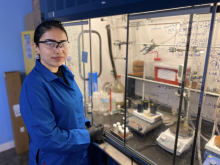
Major:
University:
Mentor(s):
Faculty Sponsor(s):
Faculty Sponsor's Department(s):
Project Title:
Project Description:
Petroleum-based plastics and refinery byproducts continue to pollute ecosystems and communities whilst devastating entire populations. Despite a steady increase of plastic recycling, studies still predict a substantial surge in the reliance of petrol-based polymers and plastic waste accumulation in megaton amounts by 2050. Concurrently, petroleum refineries generate extensive sulfur byproducts that accumulate in landfills even after creative chemical applications for other goods. In response, researchers have devised a crosslinked, sulfur-based polymer in a novel process termed inverse vulcanization. While some of the most apparent concerns with the polymerization process, such as slow reaction times and high temperatures, have been addressed, the synthesis of an elastomer with tunable mechanical properties remains unexplored. As such, this study investigates the effect of α-Lipoic Acid in a castor-oil-crosslinked sulfur polymer to formulate a mechanically modifiable and degradable elastomer. Due to the hydrogen bonding nature of α lipoic acid, polymer mechanical properties such as toughness, extensibility, and flexibility are expected to be readily tunable through the composition of α-lipoic acid. Furthermore, the unique chemistry of reacted α-lipoic acid enables the resulting crosslinked material to be chemically degraded in basic conditions. Preliminary tension results for a series of α-lipoic acid formulations confirm elasticity that is expected to improve with greater α-lipoic acid concentrations. Ultimately, the introduction of an organic and easily accessible comonomer and crosslinker progresses conventional catalytic inverse vulcanization to offer a stretchable, sustainable, and chemically
